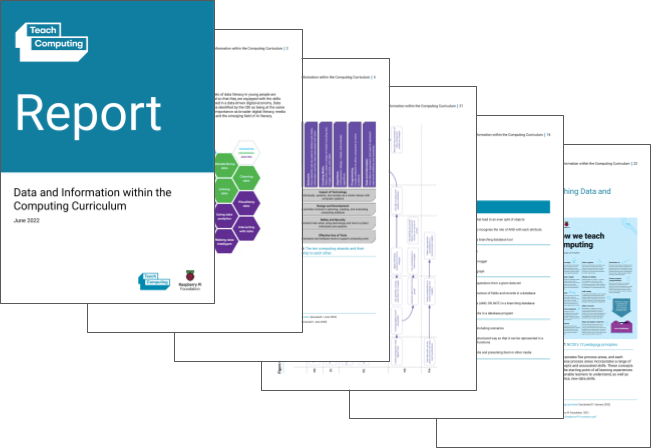Data and Information within the computing curriculum
30 June 2022

As part of the NCCE’s ongoing series exploring teaching and learning within computing, today we are publishing a report on Data and Information within the Computing Curriculum. This comprehensive report explores the ‘data and information’ strand of the curriculum and emphasises the important role that data plays across computing.
One of our goals is to develop and publish teaching and learning reports that explore a particular aspect or theme of the computing curriculum. Earlier this year, we shared our first teaching and learning report focused on Digital Literacy within the Computing Curriculum, Computer Systems and Networking within the Computing Curriculum and more recently Programming and algorithms within the computing curriculum; as of today, you can read our final report on data and information.
“To participate effectively in modern society, data skills and an awareness of how data is used are essential for all citizens; this creates an important goal for our education systems.”
The huge growth in computing has resulted in data becoming vital across society. The use of data is pervasive across all sectors and economies around the world, to analyse, evaluate, and inform decisions. The sheer volume and richness of data being collected and analysed, alongside the availability of high-performance, low-cost hardware, has meant that artificial intelligence (AI) and machine learning (ML) technologies are increasingly being applied to data to provide automated analysis and, in some cases, decision making. This increased use of data means that individuals with specialist data skills are in demand.
In exploring the concepts within this area, we highlight how the main ideas, concepts, and skills are developed over time and we summarise this progression in high-level learning graph covering key stages 1 to 5. We believe that a broad understanding of the progression that learners make between the ages of 5 and 18 will provide all educators with a valuable insight into what their learners already understand as well as what lies ahead.

In the report, we present a simplified cyclic model for working with, broken down into 5 stages, synthesised from existing research. This cycle has been used in the development of the Teach Computing Curriculum across a wide range of learners. With younger learners, each stage of the cycle is at least referred to in each unit — although there is often a predominant focus on one area of the cycle — whereas as learners get older, learning may be focused only on a singular stage of this cycle.
We also recommend a selection of relevant pedagogical principles and associated practices that computing educators can apply to support their practice. Each of these principles and practices comes with associated further reading.
Finally, we identify the many opportunities for teachers to develop their own skills, understanding, and practice in this area through the range of professional development options offered by the NCCE.
You can access the report in full below and get involved in the conversation by joining the CAS community or contacting us on twitter.